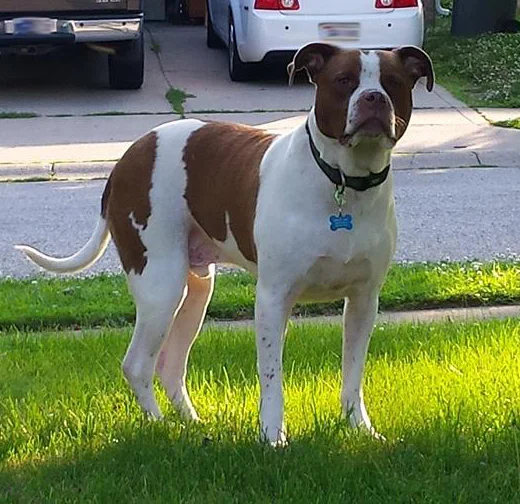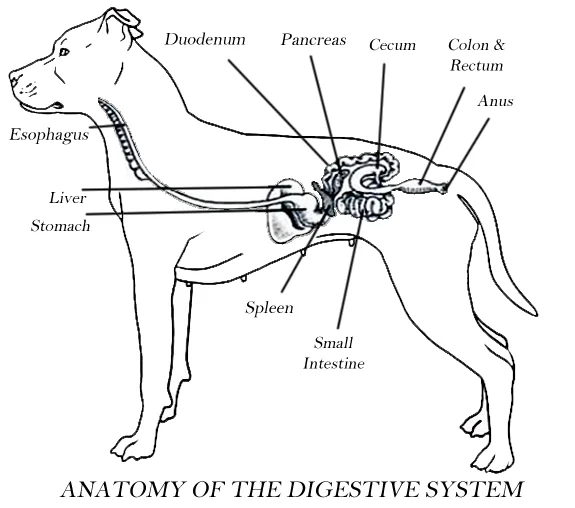In 2010 I was selected as an Animal Farm Foundation summer intern. I loved the experience! I can only aspire for Casa del Toro to have a multi-acre rescue one day!
Icecream, no longer a soft serve.
When I went into the Canine Nutrition section of the internship I was not expecting the life changing discussion that occurred. I thought I bought healthy dog food and knew what my dog needed to live a healthy life. I was mis-informed.
The night of this seminar I called my husband and told him to purchase wet food (that follows the guidelines below) and add it to our dogs' diet. From that day forward, my dog Icecream quit having a 'sensitive' stomach.
If you have a new dog and don't know its old food, you could fast for one meal (as long as the dog does not look underfed) to clean out the system.
Canine Nutrition
Many dogs cannot process/absorb wheat. Consider this when you purchase kibble for your dog.
Healthy Diet
Raw food - most digestible
Dehydrated / Home Cooked
Canned - more nutrition because fresh packed and then cooked
Kibble - cooked before it is dried
1. Raw Food
Have a higher number of amino acids available
Dogs are able to process foods easier
Meat, bones, organs
Steam vegetables first! A dog's digestive track can't break down the outer cell wall of vegetables.
Gluten free - a good option for shelter dogs that are having issues with kibble.
Bones clean their teeth.
Good for dogs with mange and skill issues
Helps many dogs get over the hump with allergies and break out of the allergic reaction loop
Grain may cause diarrhea
Protein may cause skin reaction
If going raw:
CDT Alumni Gentle Ben has food allergies and must have special food and treats.
Meat portion = $2.50
Cheaper in bulk
Don't buy ground meat!
Serve bones raw or frozen!
Also consider that if you feed a raw diet you may not be able to perform therapy work because your pet would have the potential to transmit potentially dangerous illnesses, like salmonella, to people with compromised immune systems.
2. Dehydrated / Home Cooked
Meat is cooked at a high temperature. This kills some of the bacteria and give it a longer shelf life.
Dehydrate: Carrots, sweet potatoes, parsnips, turnips, broccoli, cauliflower, etc.
3. Canned
Food is cooked once during the canning process.
Many nutrients are killed off by the heat of the canning process.
Just because the food is canned doesn't mean it is digestible for the dog.
Meat = first ingredient!
Actually, you want meat in the first three or four ingredients.
Once you start looking, you'll notice there is a lot of grain in a lot of food.
Dogs are carnivores - opt for meat.
Remember: ingredients are listed by weight not volume.
4. Kibble
Most processed = less nutritious
Look at fiber content!
5% or less = GOOD
10 - 15% = POOR SOURCE
Heated twice at high temperatures. This cooks out all of the nutritious value of the food being processed!
Must have a binder (wheat, corn, etc) something to hold the 'meat' pieces into a kibble shape.
Typically there is a final stage where manufactures spray stuff (blood and bone meal for example) on kibble to add nutrients and flavor back in.
Supplements
Fish oil
Check the label sardine oil is better
Rotate using fish oil with using other supplements
RX Diets
May be beneficial because they fix the symptoms, but still do not address the underlying issue.
By Products
This is just gross, but necessary information. When you see 'by products' listed on the ingredients label there are many things that encompass that category. Some have a high nutritional value and others are empty nutrition.
High Quality = Cow brains
Low Quality = Feathers of chicken
Beaks = are high in protein, not digestible
Fish Meal = fish scales, not digestible
Rotate Diets
Prevents allergies
Every week or every month
If you are feeding your dog a high quality of food there is less of an issue for your dog to switch foods.
This also depends on your dogs genetic make-up.
Increase Nutritional Value
Use wet food
Cow bones are okay as long as they are frozen
Pork bones/meat MUST be frozen longer to kill parasites
If feeding raw bones MUST watch for sharding and/or eating of sharp pieces.
Also if feeding raw bones watch for resource guarding.
NEVER cook bones
You want a recreational bone: neck, rib, not weight bearing
Knuckle/marrow = best to feed



